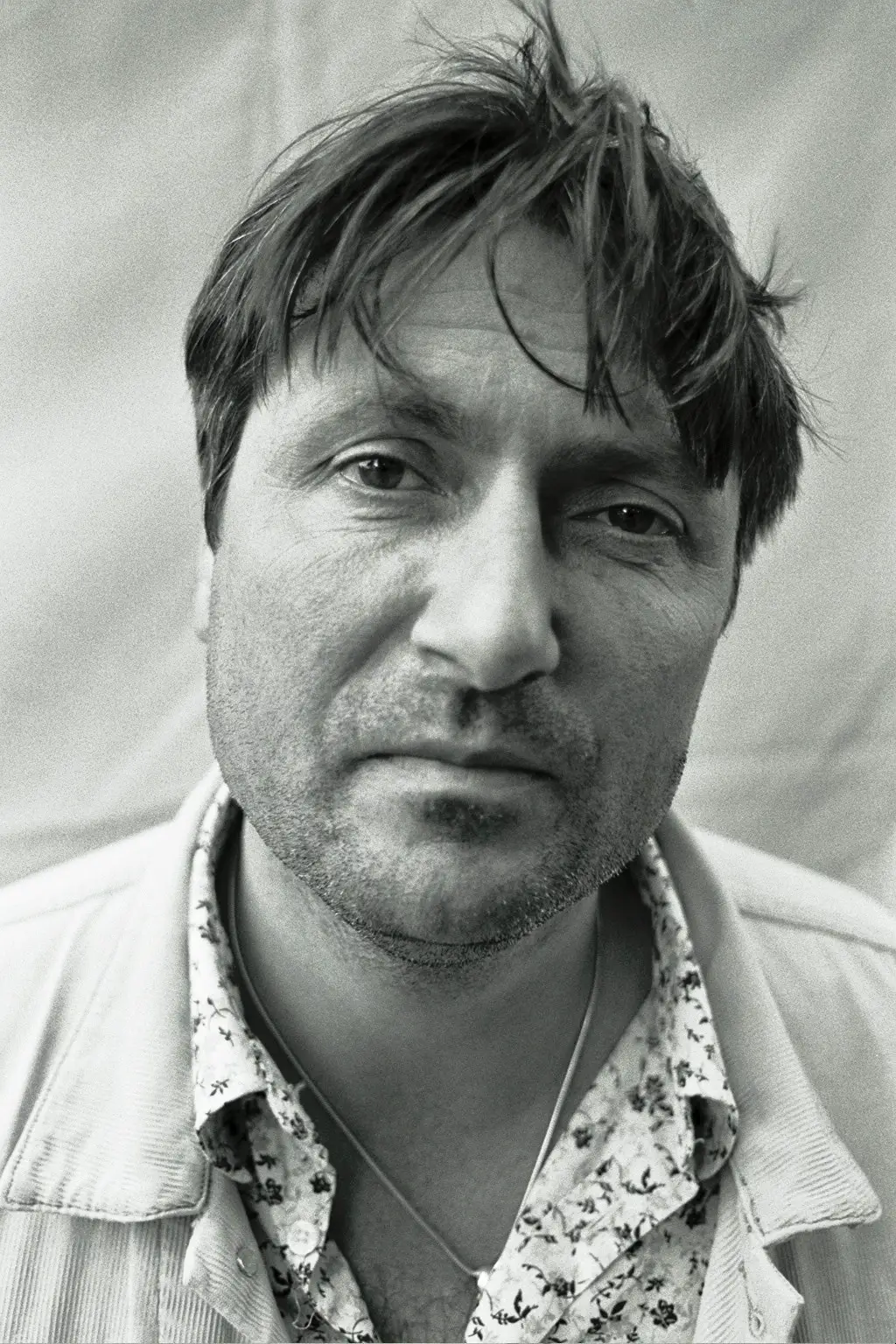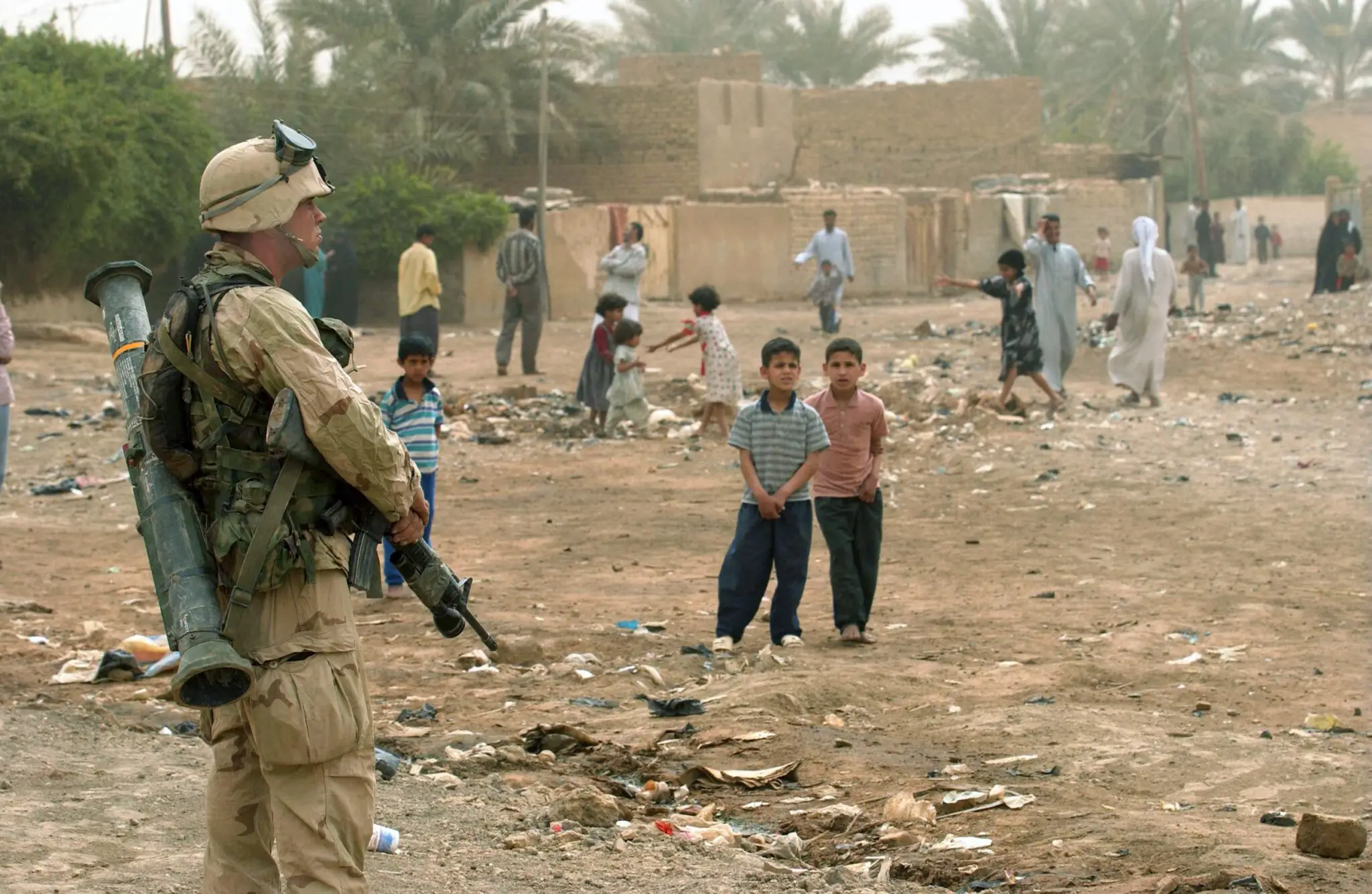
FULL POEM - SCROLL DOWN FOR LINE-BY-LINE ANALYSIS
On another occasion, we got sent out
to tackle looters raiding a bank.
And one of them legs it up the road,
probably armed, possibly not.
Well myself and somebody else and somebody else
are all of the same mind,
so all three of us open fire.
Three of a kind all letting fly, and I swear
I see every round as it rips through his life –
I see broad daylight on the other side.
So we’ve hit this looter a dozen times
and he’s there on the ground, sort of inside out,
pain itself, the image of agony.
One of my mates goes by
and tosses his guts back into his body.
Then he’s carted off in the back of a lorry.
End of story, except not really.
His blood-shadow stays on the street, and out on patrol
I walk right over it week after week.
Then I’m home on leave. But I blink
and he bursts again through the doors of the bank.
Sleep, and he’s probably armed, and possibly not.
Dream, and he’s torn apart by a dozen rounds.
And the drink and the drugs won’t flush him out –
he’s here in my head when I close my eyes,
dug in behind enemy lines,
not left for dead in some distant, sun-stunned, sand-smothered land
or six-feet-under in desert sand,
but near to the knuckle, here and now,
his bloody life in my bloody hands.

LINE-BY-LINE ANALYSIS
STANZA 1
On another occasion, we got sent out
to tackle looters raiding a bank.
The poem begins mid-conversation with the speaker anecdotally recounting his witnessing and reaction of ‘looters raiding a bank’ in an informal, colloquial manner. Although it’s not immediately evident, the speaker is a soldier fighting in a conflict that is not specified throughout the poem but is based on the British involvement in the Iraq War that began with the invasion of Iraq in 2003. The light-hearted narration throughout the poem uneasily juxtaposes this violent setting – perhaps the speaker has become hardened to the surrounding suffering.
And one of them legs it up the road,
probably armed, possibly not.
The speaker’s uncertainty of whether the criminal was armed or not portrays himself in an unskilled light, far from the master assassin one might expect. The caesura throughout these two lines adds to this, slowing the pace of the narrative and reflecting the soldier’s delayed, potentially impaired reactions. Armitage likely intended this, along with the speaker’s conversational tone, to emphasise the humanity of those at war.
STANZA 2
Well myself and somebody else and somebody else
The repetition of ‘and’ in this line conveys the speaker’s desire to highlight that he was not alone hence to not accept sole responsibility for his actions. Considering the lines that follow, the reader can infer that this is in attempt to alleviate the guilt he must now carry with him.
are all of the same mind,
so all three of us open fire.
Three of a kind all letting fly, and I swear
The unison with which the soldiers think and act (for which the ‘three of a kind’ poker reference is also a metaphor) emphasises how their prolonged involvement in the war has dissolved their individuality and with it their humanity – so conditioned to violence that they see no alternative.
STANZA 3
I see every round as it rips through his life –
The enjambement between the last line of the previous stanza and this line hastens the poem’s pace, reflecting the rapid motion of the bullets toward their targets. The imagery ‘rips through his life’ is that of brutality and, along with the harsh-sounding consonance of ‘round’ and ‘rips’ in this line when spoken, expresses the target’s acute suffering in his final moments.
I see broad daylight on the other side.
So we’ve hit this looter a dozen times
and he’s there on the ground, sort of inside out,
Here the speaker graphically describes the mangled body of the deceased. Armitage intends this violent imagery to convey the brutality of war, to which it becomes more evident the speaker has become numb – his description is closer to glorifying his actions rather than lamenting them.
STANZA 4
pain itself, the image of agony.
One of my mates goes by
and tosses his guts back into his body.
Then he’s carted off in the back of a lorry.
The speaker recognises the ‘agony’ that has been inflicted upon the deceased as he looks over his body. This does little to detract from his light-hearted narration, however, describing how one of his fellow soldiers, or ‘mates’ in his words, ‘tosses his guts back into his body’. The use of the word ‘mate’ adds a friendly, social aspect to the events, whilst ‘tosses’ paints a carefree, nonchalant image of the soldiers as they deal with the body.
STANZA 5
End of story, except not really.
This stanza presents a ‘volta’ or turning point in the poem, with the ‘end of story’ referring to the conclusion of this sequence of events and, with it, the looter’s life.
His blood-shadow stays on the street, and out on patrol
I walk right over it week after week.
Then I’m home on leave. But I blink
However, upon reflection the story remains ongoing for the narrator as, although he seemed unphased during the shooting, the reader can infer that the trauma remains with him. Armitage metaphorically likens the ‘blood shadow’ (blood stains) the looter’s death left on the streets to the trauma it has left imprinted in the narrator’s mind. However, unlike physical blood stains on the street, such mental scars cannot simply be washed away.
STANZA 6
and he bursts again through the doors of the bank.
Sleep, and he’s probably armed, and possibly not.
Dream, and he’s torn apart by a dozen rounds.
And the drink and the drugs won’t flush him out –
The speaker explains the full extent of the post-traumatic stress that he is suffering from in this stanza. When he is awake, he blinks and, in the instant his eyes close, flashbacks of the looter infiltrating the bank haunt him. When he is asleep, his dreams are drawn to the shooting in vivid detail – the looter being ‘torn apart by a dozen rounds’ almost photographically etched in his subconscious. For further emphasis, repetition of the plosive ‘b’, ‘p’, ‘t’, and ‘d’ sounds throughout this stanza give it a harshness when spoken, reflecting the impact the trauma is having on the speaker.
STANZA 7
he’s here in my head when I close my eyes,
dug in behind enemy lines,
‘Dug in behind enemy lines’ refers to the trenches, a symbol of the World Wars, hence of extreme suffering. It is also a metaphor to further describe the speaker’s unrelenting, inescapable trauma as the ‘enemy lines’ are hostile and inaccessible, rendering his efforts to reach and banish his memories (which are now his enemies) futile.
not left for dead in some distant, sun-stunned, sand-smothered land
or six-feet-under in desert sand,
In this rhyming couplet, Armitage contrasts the looters lasting physical and psychological impacts. In reality, the looter is indeed buried ‘six-feet-under’ and hence has no lasting physical impact on the speaker. Psychologically, however, as the speaker has previously made evident, the exact opposite is true.
STANZA 8
but near to the knuckle, here and now,
his bloody life in my bloody hands.
‘Bloody hands’ symbolises guilt, as though the blood from the shooting is permanently stained on the speaker’s hands. With this final stanza, the closing sentiment of the poem is one of torment – there’s no satisfying resolution to the evils of war, and even years or decades after its conclusion its devastation remains. This message is Armitage’s motivation for writing ‘Remains’.


